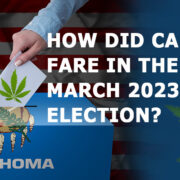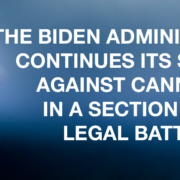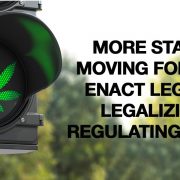If You Can’t Beat Them, Join Them – Ohio Voters Approve Adult-Use Cannabis!
On November 7, 2023 Ohio voters approved legalizing recreational marijuana use in the state making Ohio the 24th state to legalize cannabis for adult-use (previously Ohio legalized only medical cannabis). This measure known as “Issue 2”, allows the adult-use sale, purchase and possession of cannabis for Ohioans who are 21 and older. The measure, effective 30 days after the election, permits adults to possess up to 2.5 ounces of marijuana, up to 15 grams of marijuana concentrate and grow up to six plants at home.
Additionally, the measure establishes the Division of Cannabis Control within the Ohio Department of Commerce to oversee the compliance of the marijuana industry by regulating, investigating and penalizing cannabis operators and facilities.
The Growing Trend In Legalizing Cannabis – Current Standings:
Medical marijuana is legal in 38 states.
The medical use of cannabis is legal (with a doctor’s recommendation) in 38 states and Washington DC. Those 38 states being Alabama, Alaska, Arizona, Arkansas, California, Colorado, Connecticut, Delaware, Florida, Hawaii, Illinois, Kentucky, Louisiana, Maine, Maryland, Massachusetts, Michigan, Minnesota, Mississippi, Missouri, Montana, Nevada, New Hampshire, New Jersey, New Mexico, New York, North Dakota, Ohio, Oklahoma, Oregon, Pennsylvania, Rhode Island, South Dakota, Utah, Vermont, Virginia, Washington and West Virginia. The medical use of cannabis is also legal in the territories of the Northern Mariana Islands, Guam and Puerto Rico.
Recreational marijuana is legal in 24 states.
Twenty-three states and Washington DC, have legalized marijuana for recreational use — no doctor’s letter required — for adults over the age of 21. Those 24 states being Alaska, Arizona, California, Colorado, Connecticut, Delaware, Illinois, Maine, Maryland, Massachusetts, Michigan, Minnesota, Missouri, Montana, Nevada, New Jersey, New Mexico, New York, Ohio, Oregon, Rhode Island, Vermont, Virginia and Washington and the territories of the Northern Mariana Islands and Guam.
Recreational marijuana is legal in 6 tribal nations.
Six Tribal nations have legalized marijuana for recreational use. Those 6 tribes being the Flandreau Santee Sioux Tribe (South Dakota), Oglala Lakota Sioux Tribe (South Dakota), Suquamish Tribe (Washington state), Squaxin Island Tribe (Washington State), Eastern Band of Cherokee Indians (North Carolina) and St. Regis Mohawk Tribe (New York).
Conflict With Federal Law.
Under Federal law (Controlled Substances Act 21 U.S.C. 801) marijuana is designated as a Schedule I controlled substance due to the historical belief that it has a high potential for abuse, no currently accepted medical use in treatment, and lack of accepted safety for use under medical supervision.
Higher Taxes Still Remain
While the developments listed above are favorable for cannabis business, it still remains to be seen whether the Federal government will respond favorably and when favorable changes will be made to the Internal Revenue Code which treats businesses in the marijuana industry differently resulting in such business paying at least 3-times as much in taxes as ordinary businesses.
Generally, businesses can deduct ordinary and necessary business expenses under I.R.C. §162. This includes wages, rent, supplies, etc. However, in 1982 Congress added I.R.C. §280E. Under §280E, taxpayers cannot deduct any amount for a trade or business where the trade or business consists of trafficking in controlled substances…which is prohibited by Federal law. Marijuana, including medical marijuana, is a controlled substance. What this means is that dispensaries and other businesses trafficking in marijuana have to report all of their income and cannot deduct rent, wages, and other expenses, making their marginal tax rate substantially higher than most other businesses.
Reporting Of Cash Payments Still Remain
The Bank Secrecy Act of 1970 (“BSA”) requires financial institutions in the United States to assist U.S. government agencies to detect and prevent money laundering. Specifically, the act requires financial institutions to keep records of cash purchases of negotiable instruments, and file reports of cash purchases of these negotiable instruments of more than $10,000 (daily aggregate amount), and to report suspicious activity that might signify money laundering, tax evasion, or other criminal activities. The BSA requires any business receiving one or more related cash payments totaling more than $10,000 to file IRS Form 8300, Report of Cash Payments Over $10,000 Received in a Trade or Business.
The minimum penalty for failing to file EACH Form 8300 is $25,000 if the failure is due to an intentional or willful disregard of the cash reporting requirements. Penalties may also be imposed for causing, or attempting to cause, a trade or business to fail to file a required report; for causing, or attempting to cause, a trade or business to file a required report containing a material omission or misstatement of fact; or for structuring, or attempting to structure, transactions to avoid the reporting requirements. These violations may also be subject to criminal prosecution which, upon conviction, may result in imprisonment of up to 5 years or fines of up to $250,000 for individuals and $500,000 for corporations or both.
Marijuana-related businesses operate in an environment of cash transactions as many banks remain reluctant to do business with many in the marijuana industry. Like any cash-based business the IRS scrutinizes the amount of gross receipts to report and it is harder to prove to the IRS expenses paid in cash. So it is of most importance that the proper facilities and procedures be set up to maintain an adequate system of books and records.
How Do You Know Which Cannabis Tax Attorney Is Best For You?
Given that cannabis is still illegal under existing Federal law you need to protect yourself and your marijuana business from all challenges created by the U.S. government. While cannabis is legal in California, that is not enough to protect you. It’s coming down that the biggest risk is TAXES. So it is best to be proactive and engage an experienced cannabis tax attorney in your area who is highly skilled in the different legal and tax issues that cannabis businesses face. Let the cannabis tax attorneys of the Law Offices Of Jeffrey B. Kahn, P.C. located in Orange County (Irvine), the Inland Empire (Ontario and Palm Springs) and other California locations protect you and maximize your net profits. And if you are involved in crypto currency, check out what a bitcoin tax attorney can do for you.











 Follow
Follow Follow
Follow